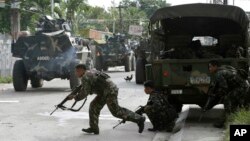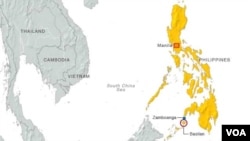Muslim rebels have attacked a second province in the southern Philippines, not far from where they are engaged in a four day-long standoff with the military.
Fighters linked to the Moro National Liberation Front on Thursday attacked the island province of Basilan, where local officials say at least two people were wounded.
Basilan Island is about 30 kilometers from the key port city of Zamboanga, where about 200 MNLF fighters have taken scores of civilians hostage since Monday.
About 13,000 residents have fled the fighting, leaving parts of the city abandoned and resembling a war zone. So far, at least nine people have died in the conflict.
JV Faustino, editor of the Zamboanga Today newspaper, tells VOA the atmosphere is tense.
"All the businesses remain closed for the fourth day today, although some people are already coming out on the streets. But generally the situation is not normal. I see a number of troops roaming around the city, including tanks and heavy military equipment."
Colonel Rodrigo Gregorio of the Philippine military says for now there is no effort to retake the areas held by rebels, who are said to be holding some of the hostages as human shields.
"There is no effort yet to decisively capture the objectives because of our present mission. Unless all else fails, including political and diplomatic means, that mission could possibly be changed. We hope we don't have to reach that point."
Zamboanga City Mayor Maria Isaballe Climaco said Thursday in a Facebook statement that talks are ongoing with rebel leaders. President Benigno Aquino has sent some of his top officials to deal with the crisis.
The MNLF has long pushed for greater autonomy in the mainly Muslim south, where more than 150,000 people have died during a four decade-long insurgency.
The MNLF signed a peace agreement with the government in 1996 that led to the creation of the Autonomous Region in Muslim Mindanao. But some of its members continued to fight, claiming Manila did not hold up its end of the deal to develop the impoverished, rural region.
MNLF founder Nur Misuari has also criticized the government's peace talks with a breakaway faction, the Moro Islamic Liberation Front. Fearing the negotiations may marginalize his own group's power, Misuari last month declared parts of the region to be independent of Manila.
But it is unclear to what extent Misuari is involved in the current standoff, as he has not appeared in public or issued any official statement. In her Facebook statement, Mayor Climaco says she spoke with Misuari, and that he has "disowned" the actions of the hostage takers.
Some government officials have denied that charge, claiming Misuari did order the attacks.
Under Misuari's leadership, the MNLF in 2001 carried out a similar attack in Zamboanga. The fighters were later allowed to leave after releasing their hostages.
Fighters linked to the Moro National Liberation Front on Thursday attacked the island province of Basilan, where local officials say at least two people were wounded.
Basilan Island is about 30 kilometers from the key port city of Zamboanga, where about 200 MNLF fighters have taken scores of civilians hostage since Monday.
About 13,000 residents have fled the fighting, leaving parts of the city abandoned and resembling a war zone. So far, at least nine people have died in the conflict.
JV Faustino, editor of the Zamboanga Today newspaper, tells VOA the atmosphere is tense.
"All the businesses remain closed for the fourth day today, although some people are already coming out on the streets. But generally the situation is not normal. I see a number of troops roaming around the city, including tanks and heavy military equipment."
Colonel Rodrigo Gregorio of the Philippine military says for now there is no effort to retake the areas held by rebels, who are said to be holding some of the hostages as human shields.
"There is no effort yet to decisively capture the objectives because of our present mission. Unless all else fails, including political and diplomatic means, that mission could possibly be changed. We hope we don't have to reach that point."
Zamboanga City Mayor Maria Isaballe Climaco said Thursday in a Facebook statement that talks are ongoing with rebel leaders. President Benigno Aquino has sent some of his top officials to deal with the crisis.
The MNLF has long pushed for greater autonomy in the mainly Muslim south, where more than 150,000 people have died during a four decade-long insurgency.
The MNLF signed a peace agreement with the government in 1996 that led to the creation of the Autonomous Region in Muslim Mindanao. But some of its members continued to fight, claiming Manila did not hold up its end of the deal to develop the impoverished, rural region.
MNLF founder Nur Misuari has also criticized the government's peace talks with a breakaway faction, the Moro Islamic Liberation Front. Fearing the negotiations may marginalize his own group's power, Misuari last month declared parts of the region to be independent of Manila.
But it is unclear to what extent Misuari is involved in the current standoff, as he has not appeared in public or issued any official statement. In her Facebook statement, Mayor Climaco says she spoke with Misuari, and that he has "disowned" the actions of the hostage takers.
Some government officials have denied that charge, claiming Misuari did order the attacks.
Under Misuari's leadership, the MNLF in 2001 carried out a similar attack in Zamboanga. The fighters were later allowed to leave after releasing their hostages.







